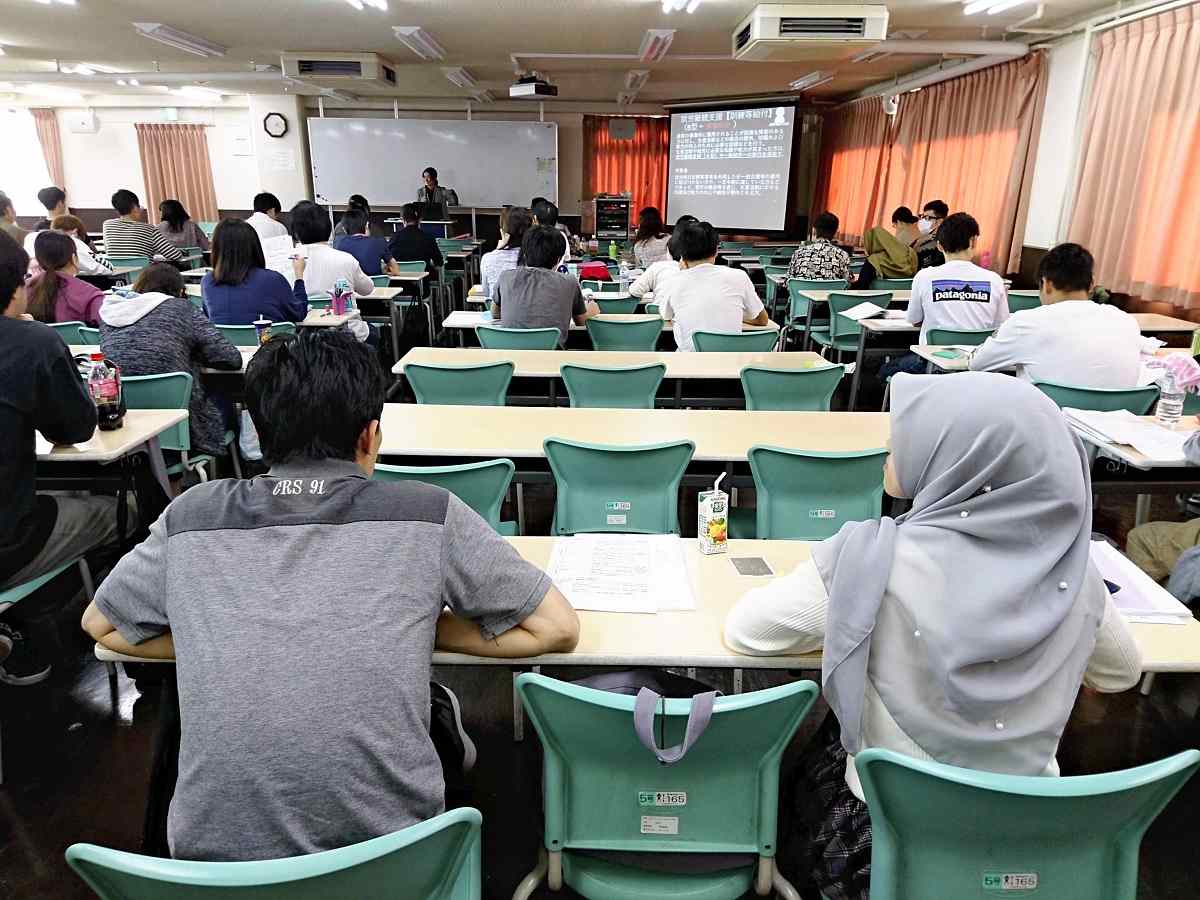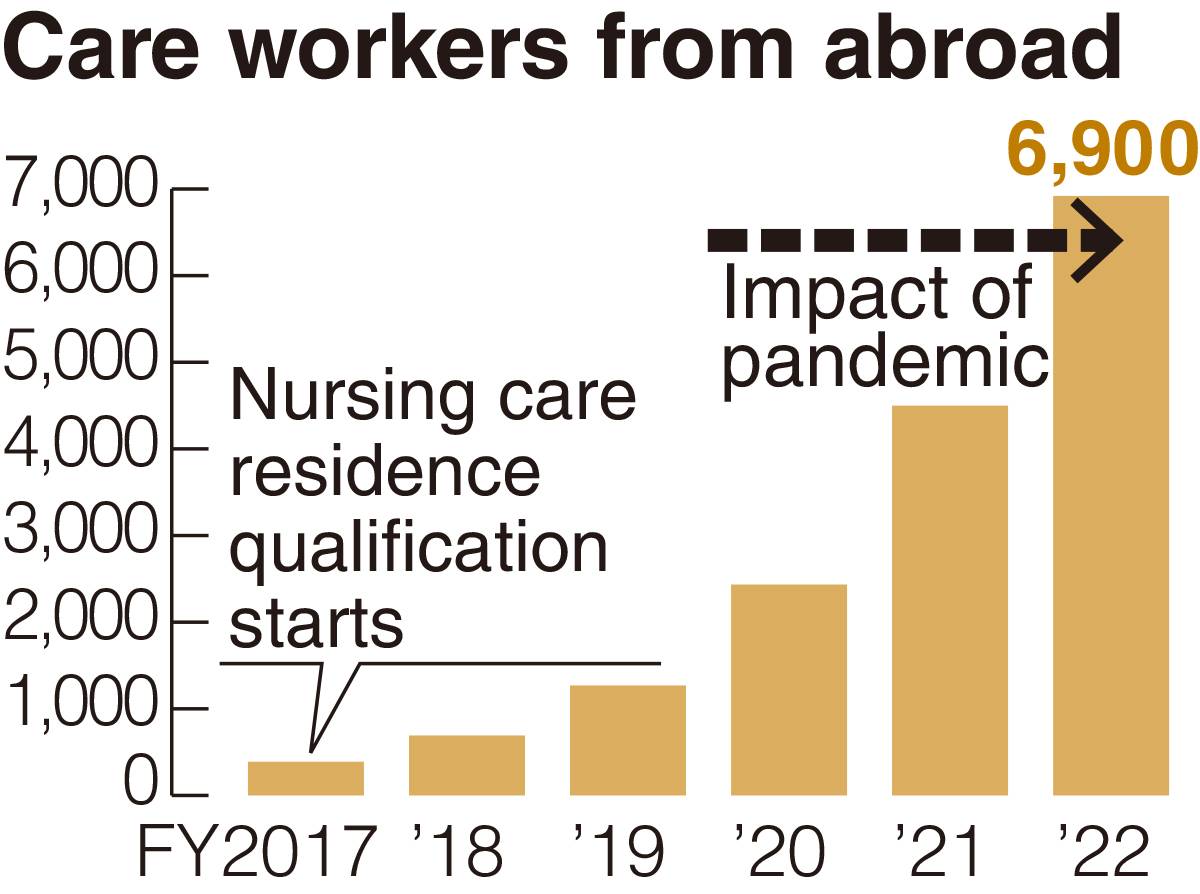
Foreign students study at a nursing care school
6:00 JST, June 21, 2023
The number of foreign certified care workers in Japan increased fivefold to about 6,900 in the three-year period from fiscal 2019 to fiscal 2022, according to a survey conducted by the Immigration Services Agency and others.
The Health, Labor and Welfare Ministry plans this fiscal year to further survey the nation’s nursing-care workplaces, which are currently suffering from a serious shortage of staff.
Care workers are defined as professionals experienced in caring for the elderly and disabled. As of March, there were about 1.88 million such workers in Japan. In a national examination that is held once a year, test takers’ communication skills and dementia-related knowledge are checked.
The government introduced the nursing care residence qualification in fiscal 2017. Since then, foreign national certified care workers are no longer restricted as to how long they can stay in Japan, effectively allowing them to stay in the country permanently. Such workers can bring family members to live here, too.
According to the survey, there were about 400 foreign caregivers working in Japan in fiscal 2017. However, this figure jumped to about 1,300 by fiscal 2019, and to about 6,900 in fiscal 2022. Vietnamese nationals accounted for about 40% of these figures.
The presence of Japan-based foreign students studying nursing care at vocational schools and other training schools has been a key factor behind the rapid increase in such workers. Foreign students comprise about 30% of students at such schools, and a number of students who continued to study in Japan without returning home amid the pandemic passed the national exam.

There has been a surge in the number of foreign technical intern trainees passing the exam after meeting the test’s eligibility requirements of “having worked or trained in the field for three years or more.” Many nursing care facilities offer benefits to certified workers, and many are reportedly motivated to become certified and live in Japan based on the expectation of salary increases.
Competition to attract nursing care personnel is currently intensifying around the globe, including in such countries as China, where demand is on the rise due to the aging of the population.
In light of such circumstances, the health ministry will this fiscal year survey foreign care workers to learn about their workplace environments and ability to communicate in Japanese, among other issues. Its intention is to formulate measures aimed at gaining an advantage in the battle to secure talented personnel.
Yuko Ito, a professor of social welfare at Ryukoku University’s Junior College, said, “The government should further encourage the creation of environments that are friendly to foreign workers by allowing staffers to use their native language to input patient-care data on tablets — such as physical condition and sleeping hours — if they have difficulty with Japanese.”
Top Articles in Society
-

Producer Behind Pop Group XG Arrested for Cocaine Possession
-

Man Infected with Measles Reportedly Dined at Restaurant in Tokyo Station
-

Man Infected with Measles May Have Come in Contact with Many People in Tokyo, Went to Store, Restaurant Around When Symptoms Emerged
-

Woman with Measles Visited Hospital in Tokyo Multiple Times Before Being Diagnosed with Disease
-

Australian Woman Dies After Mishap on Ski Lift in Nagano Prefecture
JN ACCESS RANKING
-

Producer Behind Pop Group XG Arrested for Cocaine Possession
-

Japan PM Takaichi’s Cabinet Resigns en Masse
-

Man Infected with Measles Reportedly Dined at Restaurant in Tokyo Station
-

Israeli Ambassador to Japan Speaks about Japan’s Role in the Reconstruction of Gaza
-

Videos Plagiarized, Reposted with False Subtitles Claiming ‘Ryukyu Belongs to China’; Anti-China False Information Also Posted in Japan
























